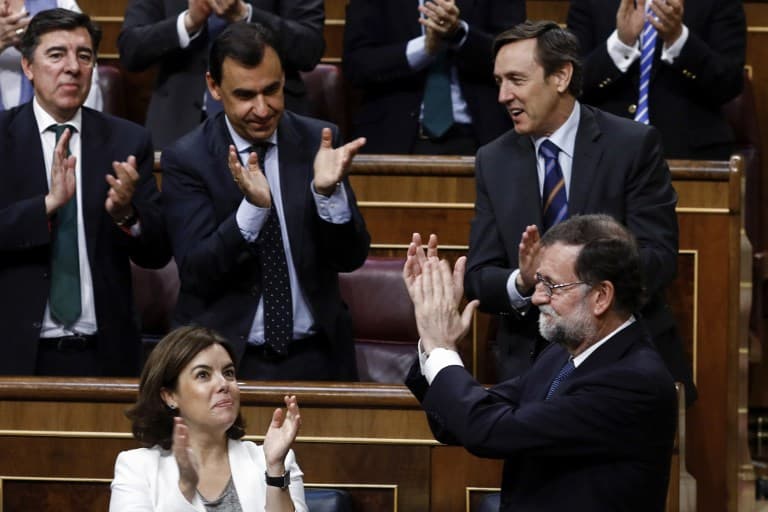Spanish government survives confidence vote over graft

Spain's conservative government on Wednesday survived a vote of no confidence tabled by the far-left Podemos party to denounce rampant corruption after a day-and-a-half of lively, sometimes acrimonious debate.
Eighty-two lawmakers in the lower house voted in favour of the motion to unseat Prime Minister Mariano Rajoy, 170 against and 97 abstained, prompting it to fail.
La #MocióndeCensura queda rechazada por el #Pleno con 82 votos a favor, 170 en contra y 97 abstenciones ? NdP https://t.co/vP7zbsTZrO
— Congreso (@Congreso_Es) June 14, 2017
The vote had never been expected to succeed as a majority of lawmakers were against it, but it was brought to parliament by Podemos to shine the spotlight on Rajoy's ruling Popular Party (PP), which has been hit by a series of corruption scandals.
It was also the occasion for other opposition parties and Podemos to lay bare their differences in a highly-fragmented parliament that has forced Rajoy to head up a minority government following two inconclusive elections in 2015 and 2016.
READ MORE: Spain's government faces no confidence vote over corruption record
Albert Rivera, head of the centre-right Ciudadanos, which like Podemos burst onto the national political scene on the back of voter frustration with traditional parties, asked its leader Pablo Iglesias to "come back to reality."
In his speech, he said that seven of the 11 measures to fight corruption that Iglesias proposed during Tuesday's pre-vote debate were already being examined in parliament.
"Leave the bus and come back to parliament," he told Iglesias, referring to a much-publicised bus commissioned by Podemos to tour Spain and denounce corruption.
"Get to work instead of presenting votes of no confidence."
To which Podemos responded that its parliamentary group was the one that had registered most initiatives.
"For a time, you were able to fool people by saying you were something else, that you had come to regenerate things, but in reality, you are a crutch for the Popular Party, nothing more," said Iglesias.
The main opposition Socialists also had a dig at Podemos.
"Stop saying that this is an opportunity to unseat Rajoy, because it isn't true," said Jose Luis Abalos, parliamentary spokesman for the Socialists, pointing to the fact that Podemos knew it did not have the necessary support to see the vote through.
The Socialists have not ruled out presenting their own motion of no confidence in the future, although they have said they will first negotiate a pact with other opposition parties -- including Podemos -- to make sure it has a chance of succeeding.
Still, the motion managed to once again raise the issue of corruption in Spain, where the PP has been particularly hard hit by graft scandals.
Opinion polls regularly show corruption is Spaniards' main concern after sky-high unemployment.
Comments
See Also
Eighty-two lawmakers in the lower house voted in favour of the motion to unseat Prime Minister Mariano Rajoy, 170 against and 97 abstained, prompting it to fail.
La #MocióndeCensura queda rechazada por el #Pleno con 82 votos a favor, 170 en contra y 97 abstenciones ? NdP https://t.co/vP7zbsTZrO
— Congreso (@Congreso_Es) June 14, 2017
The vote had never been expected to succeed as a majority of lawmakers were against it, but it was brought to parliament by Podemos to shine the spotlight on Rajoy's ruling Popular Party (PP), which has been hit by a series of corruption scandals.
It was also the occasion for other opposition parties and Podemos to lay bare their differences in a highly-fragmented parliament that has forced Rajoy to head up a minority government following two inconclusive elections in 2015 and 2016.
READ MORE: Spain's government faces no confidence vote over corruption record
Albert Rivera, head of the centre-right Ciudadanos, which like Podemos burst onto the national political scene on the back of voter frustration with traditional parties, asked its leader Pablo Iglesias to "come back to reality."
In his speech, he said that seven of the 11 measures to fight corruption that Iglesias proposed during Tuesday's pre-vote debate were already being examined in parliament.
"Leave the bus and come back to parliament," he told Iglesias, referring to a much-publicised bus commissioned by Podemos to tour Spain and denounce corruption.
"Get to work instead of presenting votes of no confidence."
To which Podemos responded that its parliamentary group was the one that had registered most initiatives.
"For a time, you were able to fool people by saying you were something else, that you had come to regenerate things, but in reality, you are a crutch for the Popular Party, nothing more," said Iglesias.
The main opposition Socialists also had a dig at Podemos.
"Stop saying that this is an opportunity to unseat Rajoy, because it isn't true," said Jose Luis Abalos, parliamentary spokesman for the Socialists, pointing to the fact that Podemos knew it did not have the necessary support to see the vote through.
The Socialists have not ruled out presenting their own motion of no confidence in the future, although they have said they will first negotiate a pact with other opposition parties -- including Podemos -- to make sure it has a chance of succeeding.
Still, the motion managed to once again raise the issue of corruption in Spain, where the PP has been particularly hard hit by graft scandals.
Opinion polls regularly show corruption is Spaniards' main concern after sky-high unemployment.
Join the conversation in our comments section below. Share your own views and experience and if you have a question or suggestion for our journalists then email us at [email protected].
Please keep comments civil, constructive and on topic – and make sure to read our terms of use before getting involved.
Please log in here to leave a comment.